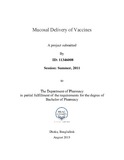| dc.contributor.advisor | Sheikh, Zara | |
| dc.contributor.author | Karim, Rejaul | |
| dc.date.accessioned | 2018-01-23T05:39:01Z | |
| dc.date.available | 2018-01-23T05:39:01Z | |
| dc.date.copyright | 2015 | |
| dc.date.issued | 2015-08 | |
| dc.identifier.other | ID 11346008 | |
| dc.identifier.uri | http://hdl.handle.net/10361/9143 | |
| dc.description | This project report is submitted in partial fulfilment of the requirements for the degree of Bachelor of Pharmacy, 2015. | en_US |
| dc.description | Cataloged from PDF version of project report. | |
| dc.description | Includes bibliographical references (page 53-67). | |
| dc.description.abstract | Vaccines are capable of inducing cellular and humoral immune responses which could provide prophylactic and therapeutic responses against various diseases such as those that are infectious in nature and other that are malignant in nature such as cancer. These responses can also be stimulated systemically and at the mucosal surfaces by activating the mucosal immune process. However most licensed vaccines are administered parenterally and fail to elicit protective mucosal immunity. Immunization by mucosal routes may be more effective at inducing protective immunity against mucosal pathogens at the site of entry. Different challenges are associated with different varieties of vaccines. The present review summarizes the various delivery strategies that can improve the mucosal delivery of the vaccines, the carrier systems and the adjuvants that can be used along with the vaccines to overcome these challenges and thereby enhance the mucosal vaccination. The usage of particulate delivery is an effective method that can be taken up to enhance mucosal vaccination. This is done by protecting the immunogenic material during the delivery, facilitating specific target oriented delivery system, and by allowing incorporation of various adjuvant materials. Efforts are focused on efficient delivery of vaccine antigens to mucosal sites that facilitate uptake by local antigen-presenting cells to generate protective mucosal immune response. Future issues regarding mucosal vaccine development have also been pointed out that includes targeting mucosal dendritic cells as an effective and safe strategy for inducing antigen-specific immunity as well as finding out new routes of mucosal immunization and antigen delivery systems along with novel mucosal adjuvants. | en_US |
| dc.description.statementofresponsibility | Rejaul Karim | |
| dc.format.extent | 67 pages | |
| dc.language.iso | en | en_US |
| dc.publisher | BRAC Univeristy | en_US |
| dc.rights | BRAC University project reports are protected by copyright. They may be viewed from this source for any purpose, but reproduction or distribution in any format is prohibited without written permission. | |
| dc.subject | Vaccines | en_US |
| dc.subject | Tissue | en_US |
| dc.title | Mucosal delivery of vaccines | en_US |
| dc.type | Project report | en_US |
| dc.contributor.department | Department of Pharmacy, BRAC University | |
| dc.description.degree | B. Pharmacy | |

